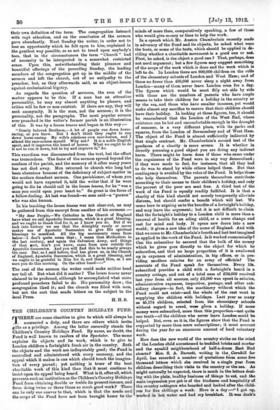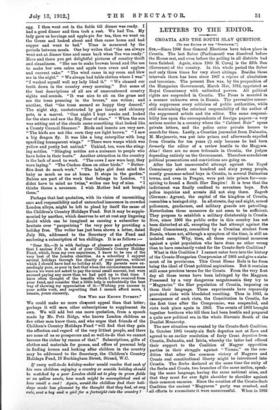THE CHILDREN'S COUNTRY HOLIDAYS FUND.
THERE are some charities to give to which will always be accounted a duty, and there are others which invite gifts as a privilege. Among the latter assuredly stands the Children's Country Holidays Fund. By name, no doubt, the Fund is well known to readers of the Spectator. The name explains its objects and its work, which is to give to London children a fortnight's fresh air in the country. Both the objects and the work are indisputably good; the Fund is controlled and administered with every economy, and the appeal which it makes is one which should touch the imagina- tion of every parent ; yet nothing is truer of the best charitable work of this kind than that it must continue to insist upon its appeal being heard. What is it, after all, which prevents such an institution as the Children's Country Holidays Fund from obtaining double or treble its present income, and from doing twice or three times as much good work P There can be only one answer to that, which is that the needs and the scope of the Fund have not been brought home to the
minds of more than, comparatively speaking, a few of those who would give money or time to help the work.
In a speech which Mr. Austen Chamberlain recently made in advocacy of the Fund and its objects, he asked what were the tests, or some of the tests, which should be applied in de- ciding whether a charitable movement is a good one or not. First, he asked, is the object a good one ? That, perhaps, does
not need argument; but a few figures may suggest something of the scope of the work which is done and the work which is left to do. In London there are 800,000 children on the rolls of the elementary schools of London and West Ham; and of
these no fewer than 480,000 never sleep a night away from London—many of them never leave London even for a day.
The figures which would be most fitly set side by side with those are the numbers of parents who have ample means to take their children for a holiday in the country or by the sea, and those who have smaller incomes, yet would make almost any sacrifice to ensure that their children should have their holiday. In looking at those figures, too, it should be remembered that the London of the West End, where existence can be hot and uncomfortable enough in the drought of summer, is a very different place, with its parks and squares, from the London of Bermondsey and of West Ham.
The object of the Fund is almost sufficiently indicated by that single contrast. Mr. Chamberlain's second test of the goodness of a charity is more severe. It is whether in directly pursuing a good object you are doing any indirect harm. There might be harm done if those who came under the cognizance of the Fund were in any way demoralized ; if they were made to feel, for instance, that all they had to do was to stand by while others helped them. But that contingency is avoided by the rules of the Fund. It helps those who help themselves. The parents themselves contribute according to their means to their children's holiday, and only the poorest of the poor are sent free. A third test of the
work of the Fund is equally readily fulfilled. It is that a charity of this kind should not merely temporarily alleviate distress, but should confer a benefit which will last. We
come here to arguing as to the benefits of a fortnight's holiday, and may leave the argument; but it is not difficult to claim
that the fortnight's holiday to a London child is more than a renewal of health for an ailing child, or a mere change and rest for mind and body. It opens new doors into a new
world; it gives a new idea of the name of England. And with that we come to Mr. Chamberlain's fourth and last test imagined as applied to the work of the Fund. Is it worked economically? Can the subscriber be assured that the bulk of the money which he gives goes directly to the object for which he subscribes, and that no large proportion of it is swallowed up in expenses of administration, in big offices, or in pro- viding needless salaries for an army of officials? The
accounts of the Fund speak for themselves. Every 10s. subscribed provides a child with a fortnight's board in a country cottage, and out of a total sum of 1'34,000 received last year from all sources, only £2,000 was spent in salaries, administrative expenses, inspection, postage, and other sub- sidiary charges—in fact, the machinery without which the Fund could not exist—and the whole of the rest went in supplying the children with holidays. Last year as many as 45,174 children, selected from the elementary schools without regard to creed, wepe given a holiday. If more money were subscribed, more than this proportion—not quite one tenth—of the children who never leave London could be helped. But, even as it is, the figures show that the Fund is supported by more than mere subscriptions ; it must account during the year for an enormous amount of hard voluntary work.
How does the new world of the country strike on the mind of the London child accustomed to huddled bricks and mortar and the squalid neighbourhood of half-a-dozen East End streets ? Mrs. S. A. Barnett, writing in the_ Cornhill for April, has recorded a number of quotations from some five thousand letters which she received in a single year from children describing their visits to the country or the sea. As might 'naturally be expected, there is much iu the letters deal- ing with the plain, healthy business of things to eat, and the main impression you get is of the kindness and hospitality of the country cottagers who boarded and looked after the child- ren for five shillings a week. Here is a day :—" I got, up, washed in hot water and had my breakfast. It was duck's egg. I then went out in the fields till dinner was ready. I had a good dinner and then took a rest. We had Tea. My lady gave us herrings and apple-pie for tea, then we went on
the Green and looked about and then came home and had supper and went to bed." Time is measured by the periods between meals. One boy writes that "the sea always went out at dinner time and came back when Tea was ready." Here and there you get delightful pictures of country thrift and cleanliness. " She use to make browan bread and She use to make her own cakes and apple turn overs and eggloes and current cake." " The wind came in my room and blew me in the night." " We always had table clothes where I was."
"I washed myself well my lady liked it." " We cleaned our teeth down in the country every morning." Bat some of
the best descriptions of all are of unaccustomed country sights and sounds. "It was nice to sit on the grass and see the trees prancing in the breeze," one writes ; and another, that "the trees seemed so happy they danced." The night sky, unobstructed by gas lamps and chimney
pots, is a marvel. "One night I kept awake and looked for the stars and saw the Big Bear of stars." " When the sun was setting out of the clouds came something that looked like a County Council Steamer." Birds and insects are very new. " The birds are not like ourn they are light brown." " I saw
a big dragon fly. It was like a long caterpillar with long sparkling transparent wings." " There were wasps which was yellow and pretty but unkind." Unkind, too, were the sting- ing nettles. " Stinging nettles are a nuisance to people who have holes in their boots." Another attraction in the country is the lack of need to work. " The cows I saw were lazy, they were laying." "The Cuckoo dines on other birds." " Butter- flies dont do much work." " The ladys girl dont mind the
baby as much as me at home. It stops in the garden." Babies are part of the work that belongs to London. "I didnt have to mind no twins," writes one boy of nine. " I thinks thems a neusence. I wish Mother had not bought
them."
Perhaps that last quotation, with its vision of unremitting care and responsibility and of untouched innocence in crowded London alleys, might be left to plead by itself the cause of the Children's Country Holidays Fund. But it may be supple- mented by another, which deserves to set at rest any lingering doubt which can be imagined as causing a subscriber to hesitate over " pauperizing " the very poor by providing a holiday free. The writer has just been shown a letter, dated July 8th, addressed to the Secretary of the Fund and enclosing a subscription of ten shillings. It is as follows :—
" Dear Sir,—It is with feelings of pleasure and gratefulness that I enclose P.O. in aid of your Children's Country Holiday Fund, which, from my own experience, I know to be one of the very best of the London charities. As a schoolboy I enjoyed several holidays through the charity of your patrons, without which I should have had no holiday at all. My parents were ex- ceedingly poor, so poor in fact that when the circumstances became known we were not asked to pay the usual sinall amount, but were excused paying any more than we had paid up to that time. I have often thought of the benefits which I have received from your fund, and consider that a little help is undoubtedly the best way of showing my appreciation of it.—Wishing you success in your noble work, and regretting that I cannot afford more, I remain, yours sincerely, Ous WHO HAS KNOWN POVERTY."
We could make no more eloquent appeal than that letter; perhaps it will earn other subscriptions to supplement its own. We will add but one more quotation, from a speech made by Mr. Pett Ridge, who knows London children as few other men know them, and who urges that friends of the Children's Country Holidays Fund " will find that they gain the affection and regard of the very littlest people, and there are none of us so prosperous and so well-to-do that we cannot become the richer by reason of that." Subscriptions, gifts of clothes and materials for games, and offers of personal help
in finding homes and looking after children in the country may be addressed to the Secretary, the Children's Country Holidays Fund, 18 Buckingham Streets Strand, W.C.
If every well-to-do koliday-maker would resolve that each of his own children enjoying a country or seaside holiday should
be matched by a poor London child set to play in green fields or on yellow sands, how much might be accomplished and at how small a cost ! Again, would the childless find their holi- days made less pleasant by the thought that they had, at any rate, sent a bay and a girl for a fortnight into the country ?







































 Previous page
Previous page